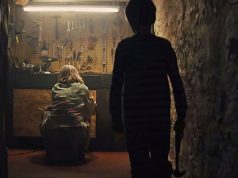The problem with both movie adaptations of “The Girl with the Dragon Tattoo” — Niels Arden Oplev’s 2009 Swedish version as well as David Fincher’s new American one — is that they believe we are far more interested in Mikael and Lisbeth’s relationship than we actually are. The central mystery is finally solved, after more than two hours, in a thrilling fashion — but instead of ending, the movie returns to the lives and loves of its characters for another 20 minutes, intent on wrapping up loose ends that we weren’t aware existed. I assume this is done out of faithfulness to Stieg Larsson’s novel, and maybe the bond between journalist and computer hacker is more resonant in print. On film it feels very much beside the point, or at least it has both times so far. Maybe the third adaptation of this book, if there is one, will make the pair’s personal connection feel plausible.
When it’s dealing with the crime investigation and Lisbeth’s harrowing ongoing battle with a corrupt social worker, Fincher’s “Girl with the Dragon Tattoo” works well enough. It’s a cold, mechanical procedural at heart, which makes a perfectionist like Fincher (“Seven,” “The Social Network”) a good choice to direct it. He and veteran screenwriter Steven Zaillian (“Moneyball,” “Schindler’s List”) wisely retained the desolate Swedish setting, which not only avoids outraging the book’s fans but is the perfect location anyway for a story about such frigid people.
High-profile Stockholm journalist Mikael Blomkvist (Daniel Craig) has just suffered a public disgracing when he’s recruited by Henrik Vanger (Christopher Plummer), the head of a wealthy industrialist family, to investigate the 1966 disappearance and presumed murder of his great-niece. The girl, Harriet, was a teenager at the time, and the killer has been taunting Henrik by sending tokens whose meaning only Henrik and the other Vangers could know. Whoever did away with Harriet must be a relative.
There are plenty of suspects, as nearly every member of this venal family is despicable and holds some icy grudge or other against someone else. Many of them live, in separate houses, on a small island near the town of Hedestad, and it is here that Mikael comes to investigate. He pores over the evidence gathered by police 40 years ago, applying a fresh perspective and the mind of a journalist to it, while simultaneously getting away from his professional scandals back in the city.
Meanwhile, only tangentially connected to all of this, there is 23-year-old Lisbeth Salander (Rooney Mara), a pale, skeletal computer hacker adorned with the kinds of tattoos and piercings that make you afraid of her when you see her on the subway. She makes a living doing thorough (and I mean thorough) background checks on people for clients who are happy to look the other way if she does something illegal like hack into the subject’s email. Her childhood evidently filled with horrific trauma, Lisbeth was a ward of the state in her teen years, and continues to be supervised by government agencies. She no longer tolerates being victimized, however.
Lisbeth’s past experiences and present expertise make her suitable for the job of helping Mikael find out who killed teenage Harriet. The film is half over before they join forces, and when they do there is some uncertainty about whether their relationship will remain strictly professional. (OK, maybe not that much uncertainty.) But beyond that, there’s nothing compelling about their partnership. The characters are intriguing separately, but their relationship to each other is no more interesting than the one between the two lead cops in a “Law & Order” episode, and it’s fraught with a lot more implausibility. Mikael and Lisbeth are barely believable as a professional duo, let alone a personal one. Whatever Craig and Mara needed to do, chemistry-wise, to make this partnership work, it didn’t happen.
Still, the Harriet mystery, growing deeper and more gruesome as new facts come to light, is whatever you’d call the movie equivalent of a page-turner. Stellan Skarsgard, Steven Berkoff, Geraldine James, and Joely Richardson shine in supporting roles as Vangers and Vanger associates. (Robin Wright is wasted as Mikael’s editor and lover.) A viewer who hasn’t read the book or seen the other movie — i.e., who doesn’t already know what’s going to happen — will no doubt find the story’s whodunit aspect satisfying.
But while this is clearly a David Fincher creation, with the images meticulously composed, the violence shocking but clinical, and the Trent Reznor/Atticus Ross musical score suitably dispassionate, the director never finds a way to make it his own. Making a film based on a recent book that’s already been adapted once puts the fiercely independent Fincher in the position of having to convince viewers that his heart is truly in this, that he’s not doing it as a favor to the studio or out of some contractual obligation. What he has delivered is adequate, but it doesn’t have any flavor — and of all the things Fincher is, “bland” is not usually one of them.
— Film.com
C+ (2 hrs., 38 min.; )
Reprinted from Film.com.





